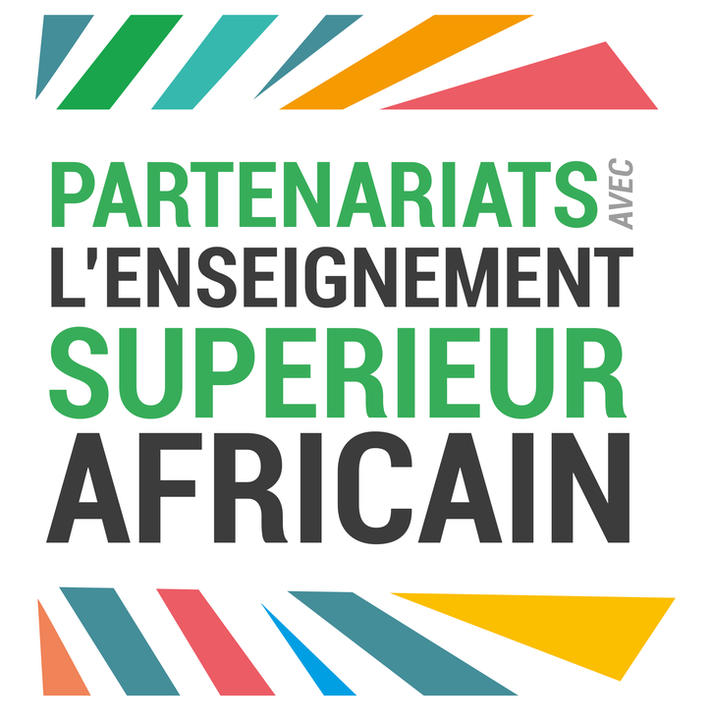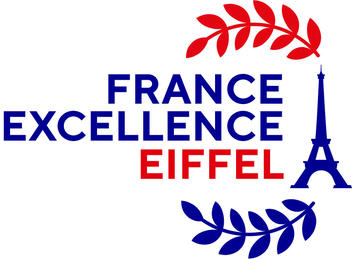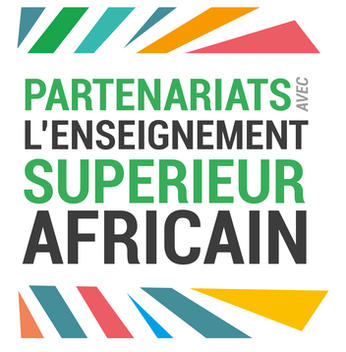
Eight laureates chosen for the 2nd edition of programme of “Partnerships with the African higher education”
Paris, on 20 April 2023 – With eight laureates chosen during its 2nd edition, the programme of “Partnerships with the African higher education” doubled its network, including now 14 African higher education institutions and 35 French institutions. Partnership training courses taught from Licence study plans to Doctorate study plans aim at developing top higher education in Africa through the professionalisation and entrepreneur spirit of students in 8 African countries. The ambition is to feed the needs in sustainable development of these countries.

Le PEA au service du partenariat Afrique-France
En novembre 2017, le Président de la République fixe un cap à l’université de Ouagadougou devant près de 800 étudiants africains : bâtir une relation partenariale entre la France et le continent africain. Il appelle notamment à « travailler au doublement des partenariats universitaires que nous avons avec l’Afrique ». Lors de son discours du 27 février 2023 à l’Élysée, il invite à aller plus loin dans cette relation partenariale au travers de projets concrets « là où nos partenaires nous attendent (…) en bâtissant une offre accrue en matière de formation professionnelle ». Un enjeu majeur pour le continent africain où 60% de la population a moins de 24 ans et où le nombre d’étudiants doit doubler d’ici 2030 pour atteindre 22 millions.
Le programme « Partenariats avec l’enseignement supérieur africain » (PEA) est financé par l’Agence française de développement (AFD), dans le cadre de la stratégie « Bienvenue en France » portée par le Ministère de l’Europe et des Affaires Étrangères (MEAE), le Ministère de l’Enseignement Supérieur et de la Recherche (MESR), et opéré par l’Agence nationale de la recherche (ANR) et Campus France. Il vise à la mise en place de partenariats stratégiques pour coconstruire entre pairs des filières de formations d’enseignement supérieur dispensées en Afrique. Ce programme pilote s’inscrit dans la dynamique de renforcement des liens entre communautés académiques africaines et françaises. Son ambition est d’allier les exigences de qualité internationale et de rayonnement des acteurs universitaires africains et français aux besoins socio-économiques locaux, tout en favorisant l’employabilité et la mobilité des étudiant.es et enseignant.es.
Une première édition, lancée en 2021, a permis la mise en place de six partenariats stratégiques. Formations d’enseignants, réception des premiers équipements pour professionnaliser les formations, lancement de près de 10 nouveaux parcours (licences et masters), refonte des maquettes pédagogiques, près de 1 000 étudiants inscrits dans les formations depuis le lancement du PEA, sont quelques-uns des premiers résultats du PEA 1. Cette deuxième édition poursuit l’extension de ce réseau de formations supérieures partenariales. Chaque édition du PEA est ouverte aux 18 pays africains définis comme prioritaires pour l’aide française au développement1 et dotée de 20 millions d’euros maximum.
Les 8 lauréats de la 2ème édition
Le deuxième Appel à projets a suscité l’intérêt de plus de 70 établissements d’enseignement supérieur, africains et français, qui ont présenté plus d’une trentaine de candidatures.
14 experts issus du monde académique et du monde socioéconomique, d’Afrique et d’Europe ont évalué les candidatures en deux étapes.
A la suite de cette évaluation, le comité de pilotage du programme (MEAE, MESR, Ministère de l’Agriculture, Ministère de la Santé, AFD, conférences d’établissements - France Universités, CDEFI, CGE - et opérateurs ANR et Campus France) a retenu 8 projets pour leur pertinence, leur qualité et leur contribution à l’atteinte des objectifs du développement durable.
Partage d’expériences, développement de nouveaux cursus, formations des étudiants, équipements de haut niveau, mobilité des enseignant.es et étudiant.es sont au cœur des projets dont les dotations s’élèveront de 1,5 à 3 millions d’euros.
Présentation des projets lauréats de la 2ème édition :
- Le projet CIPASTI « Coopération, Innovation Pédagogique et recherche Académique dans les Sciences et Techniques de l’Ingénieur en République Démocratique du Congo ». Porté par l’Université Loyola du Congo et l’Institut Catholique des Arts et Métiers (Groupe ICAM), il vise à consolider les formations de techniciens et à développer un cycle ingénieur/master en sciences et techniques de l’ingénieur pour les secteurs suivants : le génie civil, l’énergie ou les industries de transformation.
Autres partenaires : Université Toulouse III Paul Sabatier, Polytech Nantes (Nantes Université)
-
Le projet DISCOM « DIStribution des produits et services et COMmercialisation des produits locaux au Sénégal ». Porté par l’Université Iba Der Thiam de Thiès et l’Université de Lille, il a pour objectif de co-créer une filière en sciences de gestion (licence 3, master, doctorat), dans le secteur de la distribution, qui présente des enjeux économiques (création d’emplois, commercialisation des produits locaux), sociétaux (développement durable, consommation saine, inclusion des femmes) et technologiques (digitalisation, mobile) importants.
-
Le projet Ethiopie 4.0 « Former des experts aptes à démocratiser les méthodes de l’industrie 4.0 en Ethiopie et accompagner le développement économique du pays ». Porté par l’Addis Ababa Institute of Technology (AAIT) et l’Institut National Polytechnique Clermont-Auvergne (Clermont-Auvergne INP), il vise à former des techniciens et des experts industriels aptes à diffuser les nouvelles technologies liées à l’industrie 4.0, avec notamment la création d’une formation de niveau master et l’installation d’une plateforme technologique.
- Le projet ICAT « Ingénierie de la Construction et de l'Aménagement du Territoire » au Bénin. Porté par l’Université Nationale des Sciences, Technologies, Ingénierie et Mathématiques et l’Université Le Havre Normandie, il vise à structurer deux filières de formation autour de la construction durable et de l’aménagement raisonné des villes et territoires.
Autres partenaires : CY Cergy Paris Université (CYU), Institut National des Sciences Appliquées (INSA) Rennes, INSA Rouen, Conservatoire National des Arts et Métiers (CNAM)
- Le projet IDBio « Ingénierie durable des produits biosourcés » au Sénégal. Porté par l’Université Gaston Berger et l’Institut National des Sciences Appliquées (INSA) Toulouse, il vise le renforcement de compétences par la formation initiale, continue et par la recherche pour l’émergence de nouvelles filières de valorisation de ressources renouvelables et de déchets dans une stratégie de développement durable et de soutien à l’économie locale.
Autres partenaires : Ecole Nationale Supérieure des Mines d’Albi-Carmaux (Institut Mines Télécom IMT Mines Albi), Institut National Polytechnique de Toulouse (Toulouse INP), Institut Agro Montpellier, Centre National de la Recherche Scientifique (CNRS), Institut National de Recherche pour l'agriculture, l'alimentation et l'environnement (INRAe).
- Le projet INSPIRE-UAC « Innovation Santé Publique Internationale Recherche Enseignement - Université d’Abomey Calavi » au Bénin. Porté par l’Université d’Abomey Calavi et l’Université de Limoges, il a pour ambition de structurer l'offre de formation en santé publique à tous les niveaux de la filière universitaire (LMD), en renforçant les capacités humaines dans ce domaine tout en veillant à l'équité et au développement durable.
Autres partenaires : Université Paris Cité, Institut de Recherche pour le Développement (IRD)
- Le projet PreFoSyc « Professionnalisation et Renforcement de la formation à la Faculté d'Agronomie de l'Université de Parakou pour les Systèmes de production durable à base de Coton » au Bénin. Porté par l’Université de Parakou et l’Ecole Supérieure d’Agro développement international (ISTOM), il vise à assurer deux formations de niveau master, des formations de niveau doctoral et continues pour faire face aux enjeux de développement des compétences dans tous les métiers des filières associées au secteur du coton du Bénin.
Autre partenaire : Centre de coopération internationale en recherche agronomique pour le développement (CIRAD)
- Le projet TRANGA « Renforcement de capacité pour la TRansition et l’Audit éNergétique à MadaGAgascar ». Porté par l’Institut Supérieur de Technologie d’Antananarivo et l’Université Bretagne Sud, il vise la rénovation et la création de formations au niveau licence et master, ainsi qu’un appui au champ de la recherche et de la formation continue dans le domaine de l’énergie en intégrant, au-delà de la production d’énergie, les questions d’efficacité et d’audit énergétique.
Autre partenaire : Université de la Réunion
Related contents
Recommended News





















































